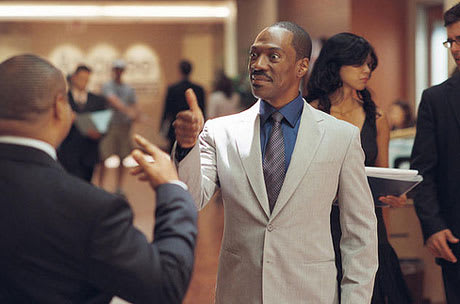Ever since Eddie Murphy was caught with a transvestite prostitute in the late '90s, his resume, save Dreamgirls, has been little more than a compounding series of dreadful high concept "comedies" aimed at as broad and undiscerning an audience as humanly possible. He's played an alien robot, a religious leader, a morbidly obese woman and, more recently, a dickhead businessman that learns valuable lessons from his daughter's imagination. It's as if he's suffering a Judeo-Christian punishment for demonstrating aberrant sexual desires.
In A Thousand Words, he again throws on a suit to ride the sanctimonious, pedagogical morality train, playing a douche bag literary agent named Jack McCall, who's known for being able to talk anyone into anything. Inevitably, this is challenged when a successful spiritual guru (read: cult leader filled with glib fortune cookie "wisdom") agrees to let him represent his five-page book should McCall agree to validate the guru's ego by adopting his rigid and unfocused ideology.
Enter the high concept wherein a Bodhi tree pops up in Murphy's backyard, shedding leaves every time he speaks a word. And since trees apparently die when all their leaves are shed, the assumption is that he too will die after saying too much, which leads to an abundance of overly strained comedic shenanigans reliant on the ubiquity of communication in quotidian social customs.
Now, if the idea of Murphy emphatically playing charades for an hour (it takes a good 30 minutes for him to finally shut up) with Starbucks employees and daycare providers is intriguing to you, then this patronizing and painfully predictable odyssey might be ideal. Surely the hilarity of literally killing oneself to adhere to social customs (rather than throwing a rock at a pushy homosexual daycare worker, he caves and starts speaking to adhere to dominant social pressure) will prove identifiable to the masses that would rather die than have some self-involved stranger look at them funny.
Of course, if you fall outside of this constraint, or take offense when someone assumes you are a complete moron, this comes across as exceedingly unpleasant and frustrating rather than funny. Similarly, the core lesson, wherein words have a ripple effect and inner peace comes from silence, or whatever, isn't even logically thought out. To boot, it suggests that arrogant cult leaders actually teach beneficial lessons by forcing people into a collective box, reinforcing the very structure that has caused wars for centuries.
Frankly, the only thing enjoyable about A Thousand Words was watching 60-year-old film critics shake their heads and plug their ears while a fire alarm warning repeatedly came on the theatre loudspeakers for the latter half of the film.
(Paramount Pictures)In A Thousand Words, he again throws on a suit to ride the sanctimonious, pedagogical morality train, playing a douche bag literary agent named Jack McCall, who's known for being able to talk anyone into anything. Inevitably, this is challenged when a successful spiritual guru (read: cult leader filled with glib fortune cookie "wisdom") agrees to let him represent his five-page book should McCall agree to validate the guru's ego by adopting his rigid and unfocused ideology.
Enter the high concept wherein a Bodhi tree pops up in Murphy's backyard, shedding leaves every time he speaks a word. And since trees apparently die when all their leaves are shed, the assumption is that he too will die after saying too much, which leads to an abundance of overly strained comedic shenanigans reliant on the ubiquity of communication in quotidian social customs.
Now, if the idea of Murphy emphatically playing charades for an hour (it takes a good 30 minutes for him to finally shut up) with Starbucks employees and daycare providers is intriguing to you, then this patronizing and painfully predictable odyssey might be ideal. Surely the hilarity of literally killing oneself to adhere to social customs (rather than throwing a rock at a pushy homosexual daycare worker, he caves and starts speaking to adhere to dominant social pressure) will prove identifiable to the masses that would rather die than have some self-involved stranger look at them funny.
Of course, if you fall outside of this constraint, or take offense when someone assumes you are a complete moron, this comes across as exceedingly unpleasant and frustrating rather than funny. Similarly, the core lesson, wherein words have a ripple effect and inner peace comes from silence, or whatever, isn't even logically thought out. To boot, it suggests that arrogant cult leaders actually teach beneficial lessons by forcing people into a collective box, reinforcing the very structure that has caused wars for centuries.
Frankly, the only thing enjoyable about A Thousand Words was watching 60-year-old film critics shake their heads and plug their ears while a fire alarm warning repeatedly came on the theatre loudspeakers for the latter half of the film.
